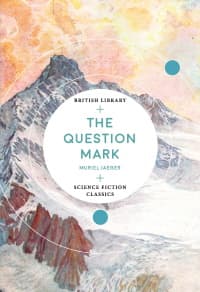
The Question Mark by Muriel Jaeger
(The British Library, 2019)
Reviewed by Andy Sawyer
Published in 1926 as an “answer” to the utopias of Wells and Bellamy, Muriel Jaeger’s The Question Mark predates Brave New World in posing the question at the heart of Aldous Huxley’s novel: if it is indeed true that utopias are more “realizable” than was previously thought, how do we prevent their realization? The paradox here, of course, is that (as Wells knew perfectly well, but left it to others to grapple with) utopias are dynamic states, throwing up their own issues which may result in social fossilisation or the deliberate thwarting of the utopian impulse.
The Bellamy/Wells/ model of the utopia (Jaeger also adds William Morris’s News From Nowhere, though Morris was himself reacting against Wells and Bellamy) is this: our viewpoint character awakes in the utopian (read: Socialist) future and is shown around by some of its inhabitants, acting as reader-substitute to marvel at this new society’s wonders. We readers then become inspired to create this marvellous future. Jaeger writes in her introduction to this, her first novel (published, incidentally by Virginia Woolfe’s Hogarth Press), that she accepts “the Bellamy-Morris-Wells world in all essentials” — except for its inhabitants: the “wise, virtuous, gentle artistic people” who guide our pioneer.
Guy Martin, the protagonist of The Question Mark is typical of those who wake in utopia, propelled by one of those hand-waving explained-later processes typical of the genre. He is an unhappy, maladjusted lower-middle class bank clerk, lacking neither the financial resources nor the energy or concentration to educate himself out of his social sphere. As the novel begins, he has been threatened with dismissal by his boss and rejected by the young woman he has met at a Socialist club. He finds himself cared for by a Doctor Wayland, in a typically clean and shiny pastoral version of England where, through the window, he sees “a glittering, smokeless machine…mowing grass at an astonishing rate… ‘You’ll see many things like that,’ said Dr. Wayland.” He gets to know Wayland’s daughter Ena and son Terry, and their cousin John who acts as his mentor. He is given a power-box, which gives him access to the resources of this world, enabling him, for instance, to power an “aerocycle” or access a “stereomovie”. He gets to know this new society, and how it differs from his.
And the difference is perhaps obvious, but interesting. While Jaeger is perhaps less concerned that Wells or Bellamy or Morris in shaping the ideological contours of her utopia, she is, as she has argued, interested in how its inhabitants are adapted to it. And we discover that “utopia” is of course, not the right word. It is a society much more affluent, equal, and less riven by conflict than Martin’s — but one with tensions of its own and where people have much more going on in their lives than having to show some resurrectee from the past around…
Some aspects of this utopia — the reader will discover at least one towards the end of the novel — are certainly not what most people would nowadays call “utopian”. But that is not Jaeger’s point; she is simply arguing against the point that transformation of material circumstances would necessarily and immediately transform human nature. In the scope of a short novel, Jaeger is unable to tackle all the issues this implies but The Question Mark certainly succeeds in picturing a society similar to, but different from, both Guy Martin’s and our own. It has interesting resonances with other utopias/dystopias — not only the models she is arguing with, but Huxley’s Brave New World, Kornbluth’s “The Marching Morons” and, possibly, the utopian fictions of Ursula K. Le Guin. It’s therefore a very early example of what the critic Tom Moylan called the “critical utopia”, a thought-provoking one, and one which is welcome to see revived.
Review from BSFA Review 16 - Download your copy here.
